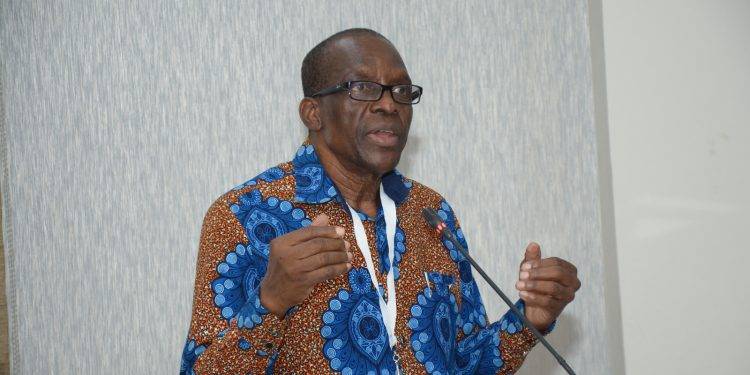The Speaker of Parliament, Alban Bagbin, has called on newly sworn-in Members of Parliament (MPs) to place the nation's interests above partisan considerations as they embark on their legislative journey. Addressing an orientation session for the MPs in Accra on Saturday, January 11, 2025, Bagbin emphasized the critical role lawmakers play in addressing Ghana’s pressing challenges and charting a path toward sustainable development.
A Call for National Unity
In his address, Bagbin underscored the importance of prioritizing Ghana's welfare over political affiliations. He urged the legislators to remain focused on their core mandate—serving the people and fostering unity across party lines.
“I want to urge you to stay focused and work assiduously toward addressing the challenges facing our nation. That is the number one priority—not the political party, but the nation. It is very critical. Those of you who are not observant, please refocus,†he advised.
Bagbin’s statement comes at a time when Ghana faces significant socio-economic challenges, including economic recovery post-pandemic, youth unemployment, and infrastructure deficits. His plea for unity and non-partisanship resonated deeply, as many Ghanaians grow increasingly frustrated with political gridlock and partisan disputes that often hinder progress.
The Benefits of Putting Ghana First
Bagbin highlighted the long-term advantages for politicians who prioritize national interests over narrow political gains. Drawing from his extensive political career, he explained that individuals who champion the collective good often enjoy greater respect, longevity, and influence in politics compared to those who remain rigidly partisan.
“Those who really take Ghana first advance in politics more than those who are extremely partisan. When you are extremely partisan, you may ascend in one regime, but in the next one, you will collapse because you are seen to identify yourself with one personality who may be the leader. After that leader, you are not relevant again,†Bagbin noted.
This observation reflects the political realities of Ghana and many other democracies, where loyalty to a single party or leader can sometimes limit a politician’s ability to connect with a broader audience or adapt to changing political climates.
Lessons from the Past
The Speaker’s comments also serve as a reflection on Ghana’s political history, where partisan politics has, at times, undermined national development efforts. Previous parliaments have witnessed heated debates and a lack of consensus on critical national issues, leading to delays in implementing policies and programs beneficial to citizens.
Bagbin, who has served in various capacities in Ghana’s parliament for over three decades, is well-placed to offer this advice. His tenure has been marked by efforts to promote dialogue, bridge divides, and strengthen the legislative process.
Challenges Facing the Current Parliament
The current parliament, like its predecessors, faces numerous challenges that require bipartisan cooperation. Among these are economic stabilization, job creation, education reform, and tackling climate change. Additionally, maintaining public trust and demonstrating accountability remain key concerns for lawmakers.
Bagbin’s call to action is a timely reminder of the critical role MPs play in addressing these challenges. By setting aside partisan differences, the legislature can function more effectively as a platform for crafting policies that benefit all Ghanaians.
The Role of MPs in Ghana’s Development
As representatives of the people, MPs are tasked with advocating for their constituents’ interests while contributing to the broader national agenda. This dual responsibility demands a delicate balance between addressing local issues and supporting policies that advance national development.
Bagbin encouraged the new MPs to take this responsibility seriously, urging them to engage constructively in debates, prioritize evidence-based policymaking, and seek common ground whenever possible.
Public Reaction
The Speaker’s remarks have drawn praise from various quarters, with many citizens and civil society organizations echoing his sentiments. Political analysts have also commended Bagbin for using his platform to emphasize the need for unity and non-partisanship in governance.
“This is exactly what Ghana needs right now—leaders who are committed to the country’s progress rather than their own political ambitions,†remarked Kwame Mensah, a political analyst based in Accra.
Social media platforms were abuzz with discussions about Bagbin’s comments, with many users calling on MPs to heed his advice and work collaboratively to address the nation’s pressing needs.
Building a Culture of Cooperation
To foster a culture of cooperation in parliament, Bagbin suggested several practical steps, including:
- Promoting open dialogue: Encouraging MPs from different parties to share ideas and collaborate on policy initiatives.
- Focusing on common goals: Identifying shared priorities such as education, healthcare, and infrastructure development.
- Strengthening institutional frameworks: Ensuring parliamentary processes are transparent, fair, and conducive to consensus-building.
By adopting these measures, parliament can become a more effective institution for driving change and delivering results for Ghanaians.
A Vision for the Future
Bagbin’s vision for a non-partisan, citizen-focused parliament aligns with the aspirations of many Ghanaians who seek a government that prioritizes their needs above political rivalry. As the new MPs settle into their roles, the Speaker’s advice offers a roadmap for fostering unity, building trust, and achieving meaningful progress.
The coming months will be a test of parliament’s ability to rise above partisan politics and deliver on its mandate. With the Speaker’s guidance and the commitment of lawmakers, there is hope that Ghana’s legislature can set a new standard for governance, one that places the nation’s interests at the forefront.
Conclusion
Speaker Alban Bagbin’s call for MPs to put Ghana first serves as a powerful reminder of the importance of unity and collaboration in governance. As the nation grapples with complex challenges, the need for non-partisan leadership has never been more urgent.
By prioritizing the collective good and embracing a spirit of cooperation, Ghana’s parliament has the potential to become a beacon of hope and progress, demonstrating that true leadership lies in service to the people.




No comments yet
Be the first to share your thoughts!